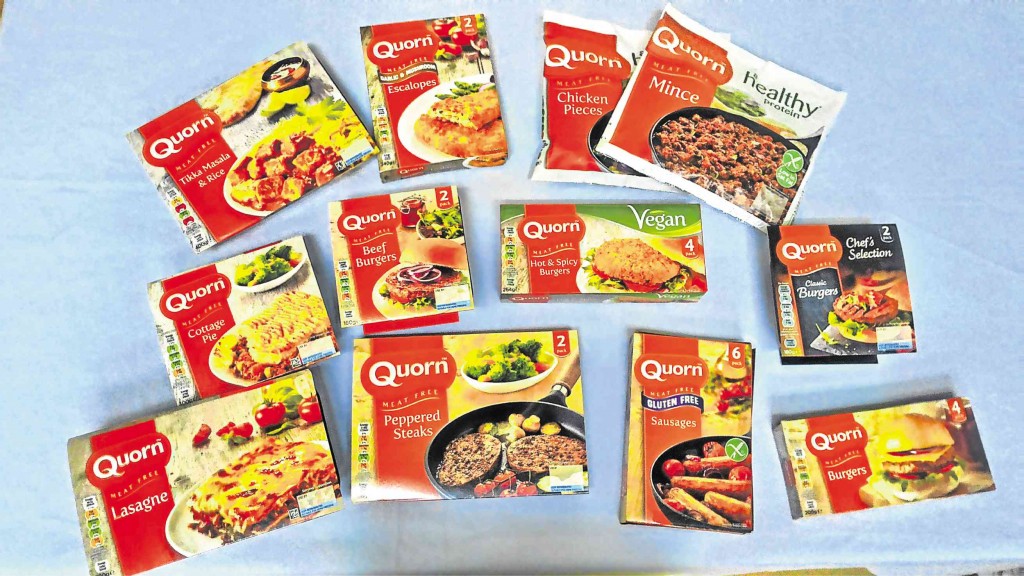Monde Nissin, Quorn Foods lead dietary ‘paradigm shift’
(Second of a series)
The acquisition in 2015 of British meat-substitute maker Quorn Foods by Philippine-based processed food maker Monde Nissin signals the latter’s serious intent to spearhead the ongoing paradigm shift in the food industry, at least in the Asian region.
This paradigm shift involves three essential factors: sustainable, nutritious and good-tasting food for humans; the Earth’s environment; and the ethical, compassionate treatment of all animals, most especially those considered as livestock. It sees the planet’s human population of over 7 billion preferring most, if not entirely, plant-based food in order to spare humans further health hazards, and the planet from further environmental destruction caused by the runaway growth of livestock farms.
US-based Allied Market Research, which predicted the business of meat substitutes to reach $5.2 billion by 2020, revealed that the per-capita consumption of meat has declined, especially in developed economies. At the same time, food products of high nutritional value and that have similar taste and texture to meat are gaining preference among consumers.
The global pressure to produce more food for more humans is driven by three things: population growth, improved economies, and the use of grains to produce fuel for cars and food for livestock.
Article continues after this advertisementLester R. Brown, president of Earth Policy Institute, assessed: “Even as we are multiplying in number, some 3 billion of us are trying to move up the food chain, consuming more grain-intensive livestock products. As incomes rise, annual grain consumption per person climbs from less than 400 pounds, as in India today, to roughly 1,600 pounds, as in the United States, where diets tend to be heavy with meat and dairy products.”
Article continues after this advertisementMonde Nissin’s acquisition of Quorn can be seen as a corporate attempt to ease this global pressure, and even turn things around. Kevin Brennan, Quorn Foods CEO, told Inquirer Science/Health: “Given the ethical, health and environmental benefits of Quorn Foods, this places corporate responsibility at the heart of everything we do.” The Carbon Trust, an independent body, shows Quorn products emitting
90 percent less (versus greenhouse gas emissions of meat), and reducing water, by the same rate, versus beef. A kilogram of beef requires a staggering 15,000 liters of water, an amount made more appalling considering 2.5 billion people already live in water-stressed areas.
Henry Soesanto, Monde Nissin CEO, added that Quorn products use significantly less land than livestock farms do in order to produce beef, pork or chicken. To make a kilo of Quorn meat substitute requires less than 2 kilos of wheat compared to up to 24 kilos of feed to produce a kilo of beef; or up to 4 kilos for a kilo of chicken.
Monde Nissin’s offering of Quorn products in the Philippines means the impending accessibility and affordability of meat substitutes.
Soesanto said: “Quorn, with its ‘deliciously healthy meat alternative’ products, helps consumers eat less meat. It plays an important role as consumers change their behavior toward preferring healthier and more environmentally sustainable food. We see Quorn attracting and retaining a bigger base beyond vegetarian consumers.”
The public will literally get a taste of Quorn products during the Great British Festival from Feb. 26 to 28 at Bonifacio High Street in Bonifacio Global City, Taguig City.
Better than beef
“Many times, a product is healthy but is not delicious. This isn’t the case with Quorn, with the extensive great-tasting products like ‘ready meals,’ ‘materials for cooking,’ ‘grilled foods,’ ‘lunch box and snacking’ to be sold in supermarkets and food service outlets like quick-serve restaurants and full-sized restaurants, it indeed provides accessibility to consumers,” added Soesanto.
He said Quorn contributes to the solution to the problem of global hunger “because it is a sustainable source of high-quality protein.”
Tim Finnigan, Quorn Foods director for technology and innovation, said foods such as those Quorn produces have already been helping consumers transition from a diet overdependent on meat.
“Unlike many plant proteins, the mycoprotein (in Quorn products) contains all the essential amino acids. It has a PDCAAS (protein digestibility-corrected amino acid score) of 0.996, which is close to perfect, and in fact is better than beef protein,” revealed Finnigan.
He added: “In order to advance our understanding of mycoprotein, we have just started a research program with University of Exeter to study the anabolic (muscle-growing) properties of mycoprotein in athletes. We anticipate a good outcome based on a theoretical consideration of the amino acid content, especially that of leucine, which is important in the anabolic process.”
